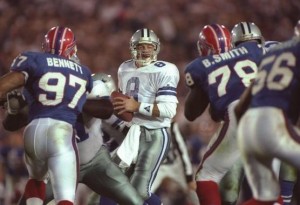The Top 20 Super Bowl Champions of All-Time Comments Off on The Top 20 Super Bowl Champions of All-Time

Despite not having a Hall of Fame caliber quarterback, the Washington Redskins clearly ranked as the best of the 44 Super Bowl Champions.
Since the first Super Bowl was held in January 1967, 44 teams have hoisted the Vince Lombardi Championship Trophy. But which of these championship teams was really the greatest of the greats?
In part two of our countdown of the Super Bowl Champions, we count down to the number one champion in Super Bowl history. For more details about the categories used to rank the teams, check out part one.
20. 1977 Dallas Cowboys – Record: 15-2 (32 points); Average loss by 11 points (9 points); Average win by 14.6 points (23 points); Opponent winning percentage: .485 (29 points); Wins over +.500 teams: 4 (25 points); Total Points: 118
Arguably the best of Tom Landry’s 29 Dallas Cowboy squads, the 1977 Cowboys combined an explosive offense led by Roger Staubach, Drew Pearson and rookie Tony Dorsett with a dominating defense led by linemen Randy White and Harvey Martin. Dallas finished 12-2 during the regular season with their two losses coming back-to-back after winning their first eight games. In the Playoffs, Dallas out-scored the Chicago Bears and Minnesota Vikings by a combined score of 60-13 to reach the Super Bowl. Facing the Denver Broncos in Super Bowl XII, the Cowboys were dominant in a 27-10 victory.
19. 1990 New York Giants – Record: 16-3 (26 points); Average loss by 8.7 points (20 points); Average win by 11.4 points (9 points); Opponent winning percentage: .500 (36 points); Wins over +.500 teams: 4 (28 points); Total Points: 119
Because the 1990 New York Giants narrowly won the NFC Championship Game over the San Francisco 49ers and then had to withstand a last second missed field goal to win Super Bowl XXV, the Giants are often overlooked when the best championship teams are discussed. However, the second of Bill Parcell’s Super Bowl teams was a solid team led by a defense that allowed the fewest points in the NFL. After starting quarterback Phil Simms was lost for the season in the 14th week, backup Jeff Hostetler stepped in and did not throw an interception in three playoff wins. Read the rest of this entry →

